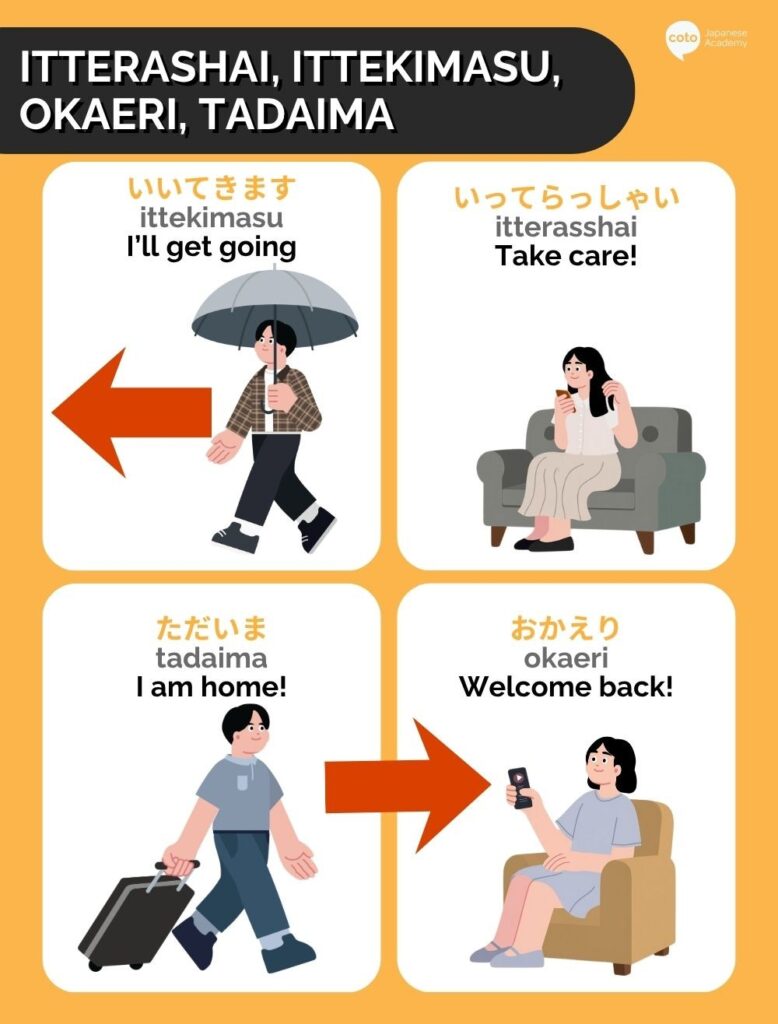Wondering when and how to use the phrases いってきます (ittekimasu), いってらっしゃい (itterasshai), ただいま (Tadaima), おかえりなさい (okaerinasai)? These common Japanese expressions are used during everyday departures and arrivals, said between the person who welcomes the other.
In English, we might just say “goodbye” or “welcome back,” but in Japan, there are four key phrases that carry a deeper sense of everyday etiquette. You’ll hear them everywhere, from children leaving or returning home from school, to coworkers heading out to visit clients. These short exchanges feel natural and warm, reflecting a shared sense of care and awareness. But when exactly do you use them, and how can you make them sound natural? Let’s break it down in our full guide below.
How to Use Ittekimasu and Itterasshai
When to Use Ittekimasu, Itterasshai

Ittekimasu and itterasshai are everyday Japanese greetings used whenever someone is leaving a place. Ittekimasu is said by the person who’s leaving, and Itterasshai is the warm reply from those staying behind. It’s more than just a “goodbye.” There’s a subtle feeling of care and connection in the exchange that makes it feel personal.
You might think these phrases are only for leaving home, but they’re used in many parts of daily life in Japan, even in customer service and work! In hotels, staff often say “itterasshaimase,” a polite version of “itterasshai,” when guests leave, wishing them a safe outing and a pleasant day. In offices, coworkers commonly exchange “ittekimasu” and “itterasshai” when someone heads out for a meeting, a client visit, or even a quick errand. Even in professional settings, these greetings are light, friendly, and help keep a sense of harmony among the team.
1. Ittekimasu (行ってきます)
The phrase “Ittekimasu” is typically used by a Japanese person when they are about to leave somewhere, such as from the office.
Grammatically, it combines two verbs: 行く (iku), meaning “to go,” and 来る (kuru), meaning “to come,” into the compound form 行ってくる (itte kuru).
If you translate ittekimasu literally into English, it might come out as “to go, to come,” which can be confusing at first. But keep in mind that, unlike many languages, Japanese doesn’t have a true future tense. Any sense of “will” or future action is usually conveyed through context, other verb forms, or adverbs. In this case, you could interpret it as “I’m going, and I’ll come back.”
Also, the Japanese language often omits the subject when it’s clear from context. That means in everyday situations, the simplest way to understand ittekimasu is as “See you later” or “I’m leaving.” It’s a short, natural phrase that shows both departure and the intention to return.
The polite form of this is 行ってきます (itte kimasu). This structure follows the pattern of 〜てくる, which is often used to express doing something and then returning, or a change that occurs and reaches the speaker. For example, “学校に行ってくる” means “I’m going to school and will come back.”
The closest literal translation would be “I’ll go and I’ll come back”. However, a more natural translation would be something like “see you later.”
2. Itterasshai (いってらっしゃい)
If you hear someone say ittekimasu, the proper response is itterasshai! Literally, itterasshai means “please go and come back.” In everyday use, it’s similar to saying “see you later,” “have a good day,” or “take care,” but none of these English expressions fully capture the warmth and care behind the Japanese phrase.
The word itterasshai is actually a combination of two Japanese words: 行く (iku), which means “to go,” and いらっしゃる (irassharu), an honorific form of “to come” or “to be.” Put together, it carries the meaning of “please go and come back.”
“Ittekimasu” expresses that “I will be going now, but do not worry, I will safely return” while “Itterasshai” indicates that, “You will be leaving soon, but please do come back safely”.
The casual form of itterasshai is 行っておいで (itte oide). Here, oide literally means “come here.” It’s common in Japan for people, especially among family or close friends, to just say おいで! as a casual way of telling someone to come along. Using itte oide keeps the same sense of “go and come back,” but in a more relaxed, familiar tone.
Of course, in many cases, you don’t have to wait to hear ittekimasu before saying itterasshai. For example, if you see someone heading out the door, you can greet them immediately with a cheerful, “Itterasshai!”
Take a look at a conversation between Toshio and Mika below, both who are brother and sister.
としお:アイス、買いに行くけど。
Toshio: Aisu, kai ni iku kedo.
Toshio: I am going to buy ice.
みか:いいね!わたしのもお願い。
Mika: iine. watashi no mo onegai.
Mika: Nice! Me too, please!
としお:じゃ、いってくる!
Toshio: Ittekuru!
Toshio: I will leave!
みか:いってらっしゃい!
Mika: Itterasshai!
Mika: Take care!
Example 2:
みか:お母さん、いってきます!
Mika: Mum, I’m going out now!
Mika: Okaasan, ittekimasu!
母:どこ行くの?
Haha: doko iku no?
Mum: Mika, where are you going?
みか:友達と映画、見に。待ち合わせに遅れそうだから、バイバイ!いってきます。
Mika: I’m going to watch a movie with my friend. I’m a bit late, so bye-bye! I’m off!
Mika: Tomodachi to eiga mi ni. Machiawase ni okure souda kara, baibai! Ittekimasu.
母:はい、いってらっしゃい、気をつけてね!
Haha: Hai, itterasshai, ki o tsukete ne!
Mum: See you later, be careful!
“Ittekimasu” is not a simple goodbye and should not be employed as such. It implies that you will return to the place you are leaving. Hence, the “Itterasshai” as a reply implies that the other party is waiting for your return.
Although there is no absolute rule, most of the time, “Ittekimasu” comes first. Exchanging these two terms emits a strong and warm feeling of returning safely to the place where one belongs.
When Not to Use Ittekimasu and Itterasshai
Ittekimasu and itterasshai are greetings used when someone is leaving, but they aren’t appropriate in every situation. These phrases carry the nuance that the person leaving will return to the same place, so it only makes sense to use them when that’s actually the case.
For example, you wouldn’t normally say ittekimasu when leaving a store or restaurant, or when visiting someone else’s home as a guest. Saying ittekimasu in those situations would imply that you plan to come back, like inviting yourself back whenever you feel like it! In these cases, the proper phrase is お邪魔しました (ojama shimashita), which politely acknowledges that you were intruding and are now leaving.
Similarly, you wouldn’t say itterasshai to a guest unless they actually live there. Instead, a casual またね (mata ne), meaning “see you later,” or a polite farewell like 失礼します (shitsureishimasu) or さようなら (sayonara) would be more appropriate. Itterasshai is natural only when you are staying behind and have a friendly or familiar relationship with the person leaving. Using it with strangers or in formal customer interactions can feel awkward or out of place. In those situations, you might instead say 気を付けて帰ってきてください (Ki o tsukete kaette kudasai), which means “please have a safe trip home.”
How to Use Tadaima and Okaerinasai
Similar to the “Ittekimasu” and “Itterasshai”, the two phrases go hand-in-hand. “Tadaima” and “okaerinasai” or “okaeri” are used when someone is returning.
1. Tadaima (ただいま)
Literally, the word “tadaima” means “right now”. Looking more closely at the phrase, tada means “just” and ima means “now.” However, in this specific context, it is a condensed version of ただいま帰りました (tadaima kaerimashita), which means, “I have just come back.”
Tadaima is used by the person who is returning home, to the office, or to a familiar place after being away.
2. Okaerinasai (お帰りなさい)
When you’re the one greeting someone who has just returned, you say おかえりなさい (okaerinasai). This phrase is used in response to ただいま (tadaima), acknowledging the person’s return. The full, polite form, okaerinasai, breaks down into three parts: お (an honorific prefix), 帰り (kaeri, meaning “return”), and なさい (nasai, a polite imperative roughly meaning “please do”). Literally, it conveys “Please return safely” or “Welcome back.” The shorter form, おかえり (okaeri), is the casual version, commonly used among family, close friends, or colleagues in informal situations.
At home, a family member returning from school, work, or errands might say tadaima, and those at home respond with okaeri. In workplaces, coworkers might greet someone returning from a meeting, an errand, or even a short break with okaeri.
Example 1:
としお:ただいま!バニラアイス、買ってきたよ!
Toshio: I’m back! I bought vanilla ice cream.
Toshio: Tadaima! Banira aisu katte kita yo!
みか:おかえりなさい!ありがとう。
Mika: Welcome back! Thank you, Toshio~
Mika: Okaerinasai! Arigatou.
Example 2:
みか:ただいま!
Mika: I’m home!
Mika: Tadaima!
母:おかえり。楽しかった?
Haha: Okaeri. Tanoshikatta?
Mum: Welcome home! Was it fun?
みか:うん!
Mika: Un!
Mika: Yes!
When Not to Use Tadaima and Okaerinasai
While tadaima and okaerinasai are everyday greetings at home and in familiar settings, they aren’t used in every situation. You generally wouldn’t say tadaima when returning to a place where you don’t have a personal connection, such as a stranger’s house or a public space. Similarly, okaerinasai is reserved for welcoming someone back who has a meaningful tie to the place: family members, close friends, coworkers, or guests at a hotel. Using it in a casual or professional setting where there’s no relationship might feel awkward or overly familiar.
Study Japanese with us and learn more expressions!
Of course, speaking Japanese fluently goes beyond memorizing phrases. Want to learn how to speak Japanese for everyday life? Join Coto Academy’s intensive or part-time courses, designed to build practical conversation skills and real-world communication confidence.
Build your confidence and conversational skills by joining the fun, flexible lessons at Coto Academy! Our beginner course covers the essentials—from hiragana and katakana to grammar—so you can start speaking Japanese in just four weeks.
We currently offer classes in Tokyo and Yokohama, as well as online classes, with a maximum of eight students per class. You’ll learn from native, professional instructors who make lessons both effective and enjoyable.
Ready to get started? Fill out the form below to contact us!
FAQ
What does "Ittekimasu" mean and when is it used?
“Ittekimasu” (いってきます) is a phrase used by individuals when they are about to leave a place, such as home or the office. It literally translates to “I’ll go, and I’ll come back,” conveying the message “I am going now, but I will return safely.” It’s similar to saying “See you later” in English.
How should one respond to "Ittekimasu"?
The appropriate response to “Ittekimasu” is “Itterasshai” (いってらっしゃい), which literally means “Please go and come back.” This phrase expresses the sentiment, “You will be leaving soon, but please do come back safely.” It’s like saying “Have a good day” or “Take care” in English.
What is the meaning of "Tadaima" and when is it used?
“Tadaima” (ただいま) is a phrase used by individuals upon returning home or to a familiar place. It translates to “I am back” or “I’m home,” signaling one’s return.
How should one respond to "Tadaima"?
The customary response to “Tadaima” is “Okaerinasai” (おかえりなさい), meaning “welcome back.” It acknowledges and greets the person returning home.
Can "Ittekimasu" and "Itterasshai" be used in professional settings?
Yes, in professional settings, when leaving the office for a short period, such as running an errand or going for lunch, employees might use “Ittekimasu” or the more formal “Itte mairimasu” (行って参ります). Colleagues typically respond with “Itterasshai” or the formal “Itterasshaimase” (いってらっしゃいませ).
Yes, other related phrases include:
“Konbanwa” (こんばんは): Used to say “good evening.”
“Ohayou gozaimasu” (おはようございます): Used to say “good morning.”
“Konnichiwa” (こんにちは): Used to say “good afternoon” or “hello.
Read more:
